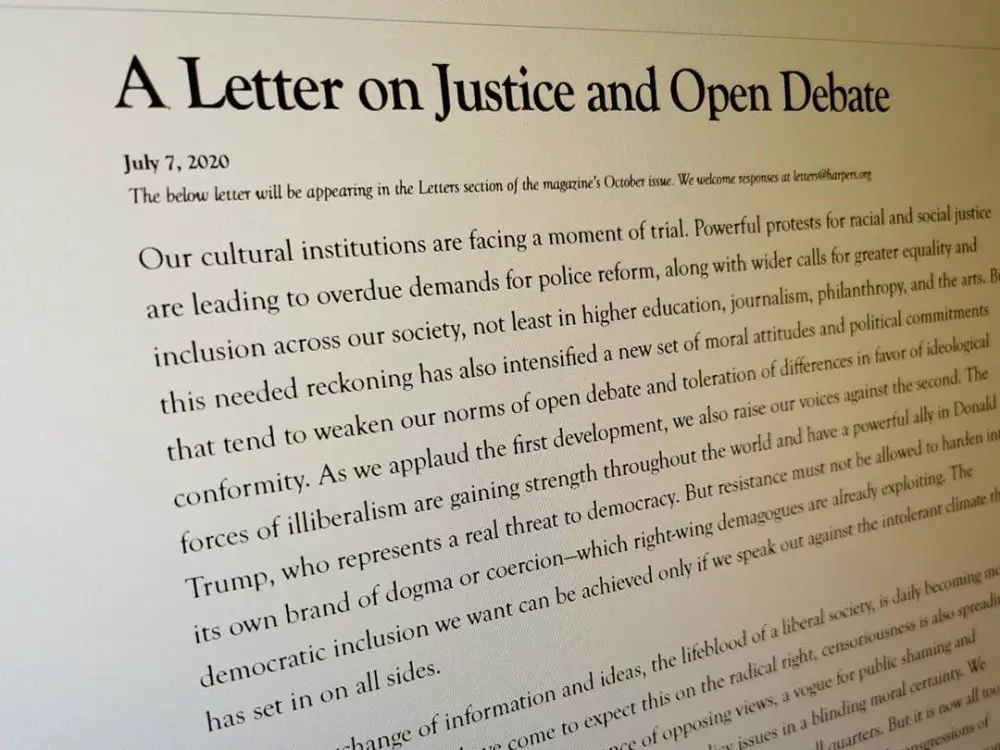In early June, “Harry Potter” author J.K. Rowling came under fire for releasing a series of anti-transgender tweets. She began by reacting to an article titled “Opinion: Creating a more equal post-COVID-19 world for people who menstruate.” She took issue with the phrase “people who menstruate” and sarcastically replied, “‘People who menstruate.’ I’m sure there used to be a word for those people. Someone help me out. Wumben? Wimpund? Woomud?”
The phrase “people who menstruate” refers to trans men or gender non-binary persons who menstruate instead of only women, but Rowling was either oblivious to this inclusivity or opposed to it all together.
However, instead of taking a moment to learn from her ignorance, Rowling doubled down and continued to tweet. “If sex isn’t real, there’s no same-sex attraction. If sex isn’t real, the lived reality of women globally is erased. I know and love trans people, but erasing the concept of sex removes the ability of many to meaningfully discuss their lives. It isn’t hate to speak the truth.”
This statement makes no sense. No one asked Rowling to comment; yet she chose to anyway, without researching the issues before tweeting to her millions of followers. It does not harm Rowling to use inclusive language surrounding menstruation. It does not take anything away from her own identity, yet she sees others’ identities as a threat to her own womanhood, which is harmful to the trans community.
Following the backlash against her, Rowling signed a letter titled “A Letter on Justice and Open Debate,” published in Harper’s Magazine on July 7. Dozens of other notable figures in academia, writing and publishing also signed the letter, which seems to decry “cancel culture.” The letter argues that “the free exchange of information and ideas, the lifeblood of a liberal society, is daily becoming more constricted.”
The letter offers examples of this “constriction”: editors getting fired for “running controversial pieces,” books being pulled for “alleged inauthenticity,” the restriction of what journalists can write about, and so on. While the Harper’s Magazine letter puts forth these examples in the abstract, they fail to include a single concrete instance in which any of these “constrictions” have occurred.
“The vagueness of the examples forced many readers to guess: Was one of the editors ‘fired for running controversial pieces’ James Bennet, who resigned from his post as editorial page editor at the New York Times after the publication of an incendiary column by Arkansas Sen. Tom Cotton, which he said he had not read before publication, caused a staff revolt?” Mary McNamara wrote in the L.A. Times. “Was the ‘good faith disagreement’ that should be preserved a reference to J.K. Rowling, a letter signatory, who has been criticized for her recent assertions that trans women are something other than women?”
The lack of clarity surrounding the examples forces the reader of the Harper’s Magazine letter to make assumptions, and leads to a failure to understand exactly what problem that the letter seeks to address.
However, the signatories of the letter assert that “this stifling atmosphere will ultimately harm the most vital causes of our time. The restriction of debate, whether by a repressive government or an intolerant society, invariably hurts those who lack power and makes everyone less capable of democratic participation.” If this problem is truly going to cause harm to “the most vital causes of our time,” the letter needs to address specifically what “the restriction of debate” really means.
Are the signatories concerned that valid arguments will be shut down? Or is this a concern that they will be held accountable for their words or actions? Ironically, the letter worries about limiting the voice of “those who lack power,” but all of the signatories have a level of influence. Most, if not all, are well-regarded writers, publishers, artists or academics.
“The letter doesn’t cite a single specific example, only vague allusions to events that the reader may, or may not, be aware of. It doesn’t say who, exactly, is being silenced, or which opinions are being silenced. It doesn’t say who is doing the silencing, but implies that social media might have something to do with it. Maybe,” Dani Di Placido wrote in Forbes. Perhaps the signatories are worried about the cancel culture that has emerged on social media. However, there is no mention of social media or cancel culture in the Harper’s Magazine letter at all.
Trans author Jennifer Finney Boylan regrets signing the letter and wrote on Twitter, “I did not know who else had signed that letter. I thought I was endorsing a well meaning, if vague, message against internet shaming. I did know Chomsky, Steinem, and Atwood were in, and I thought, good company. The consequences are mine to bear. I am so sorry.” Boylan seemingly did not know that Rowling would also sign the letter.
I did not know who else had signed that letter. I thought I was endorsing a well meaning, if vague, message against internet shaming. I did know Chomsky, Steinem, and Atwood were in, and I thought, good company.
The consequences are mine to bear. I am so sorry.
— Jenny Boylan 🍯 (@JennyBoylan) July 7, 2020
Others refused to sign the letter in the first place. “Okay, I did not sign THE LETTER when I was asked 9 days ago because I could see in 90 seconds that it was fatuous, self-important drivel that would only troll the people it allegedly was trying to reach — and I said as much,” Huffpost enterprise director Richard Kim tweeted.
Concerningly, amongst the signatories of this letter is Margaret Atwood, feminist author of “The Handmaid’s Tale.” In her novel, she explores a world where dissent is limited and a harsh, apocalyptic authoritarian government rules the United States and strips women of their rights.
While I understand that this novel calls for free speech and free expression, the signing of this letter feels tone deaf and contrary to the message of the text. Yes, open debate is important to democracy, but does this extend to harmful beliefs that invalidate the identities of others, like Rowling with the trans community? Should we allow a debate over whose identities are valid and whose are not?
The timing of the release of the Harper’s Magazine letter is also concerning. “I have no idea why those who wrote and signed it thought that the middle of a global pandemic and a worldwide uprising against law enforcement’s long history of racist brutality was an ideal moment to give young people a stern talking to about the moral and societal risks of cancel culture,” McNamara wrote.
In a time when people are rising up for Black Lives Matter, when people are dying of COVID-19, is cancel culture really the biggest threat that will harm “vital” causes? If these signatories care about the vague vital causes that they appear so worried about, wouldn’t it make more sense to instead lift up causes that actually matter and give attention to them?
Even the powerful who get “cancelled” have a way of coming back into influence. “For example, J.K. Rowling jokingly claims to have been ‘on my fourth or fifth cancellation’ in her recent essay. But it’s impossible to silence the world’s most successful children’s author; her influence is being dampened by her terrible opinions, to some degree, but it certainly won’t evaporate completely. You can’t ‘cancel’ a multi-millionaire with 14.3 million Twitter followers,” Di Placido wrote.
He’s right. You can’t erase the influence of someone with millions of people she can access at the tips of her fingers, with more money than you or I will likely see in our lifetimes. Her money and her followers make her difficult to silence, so her signature on the Harper’s Magazine letter is particularly ludicrous.
Another example is YouTuber and makeup mogul Jeffree Star, who admitted to saying horrible racist things in the past, and despite multiple “cancellations,” continues to have a successful YouTube channel with over 17 million subscribers, a makeup line and a net worth of $200 million. Just last week he released a video of himself in an ornate, gold room in his house in which he lectured his followers about supporting the Black Lives Matter movement, yet failed to include any tangible actions his followers could take anywhere in the video or the description, leading people to label his video “performative activism.”
To prove my point, below is a list of celebrities who, like Star, have supposedly been “cancelled” but still have extreme success and wealth:
Director Woody Allen allegedly molested or raped his daughter as a child. However, he continues to make movies despite constant backlash and has a net worth of $140 million.
YouTuber Shane Dawson performed racist parodies including the use of blackface, used anti-LGBT slurs and made inappropriate jokes sexualizing children and animals. However, he still has over 21 million YouTube subscribers and a net worth of $12 million.
Talk Show Host Ellen DeGeneres has faced accusations of being excessively mean to her employees yet continues to host her show “Ellen” and has a net worth of $490 million.
Singer Lana Del Rey made a problematic Instagram post on May 21 shaming other female singers for performing sexually and called out certain singers by name, most of them women of color. However, despite the backlash, she still has over 16 million Instagram followers and a net worth of $30 million.
Talk Show Host Jimmy Fallon performed in blackface on “Saturday Night Live” but still hosts “The Tonight Show” and has a net worth of $60 million.
Talk Show Host Jimmy Kimmel performed in blackface, and like Fallon, continues to host his late night show, “Jimmy Kimmel Live,” and has a net worth of $50 million.
Singer John Lennon beat his romantic partners and children yet still enjoyed massive success in The Beatles up until his assassination. He remains a pop culture icon.
Comedian Jerry Seinfeld dated a high schooler when he was 38, yet continued to have huge success on “Seinfeld” and now on “Comedians in Cars Getting Coffee.” He has a net worth of $950 million dollars.
Actor Mark Wahlberg harassed Black children with racial epithets in 1986 and beat two Vietnamese American men in 1988, yet continues to have commercial success. He starred in three movies in 2020 and has two upcoming projects for 2021, along with a net worth of $300 million dollars.
I’m not arguing that any singular mistake should cost someone their career; that requires case-by-case evaluation. But this list illustrates that cancel culture is not a pressing issue worthy of the Harper’s Magazine letter. Those in power should use their influence to call for societal change, not lecture us on holding them accountable for their problematic actions.

















